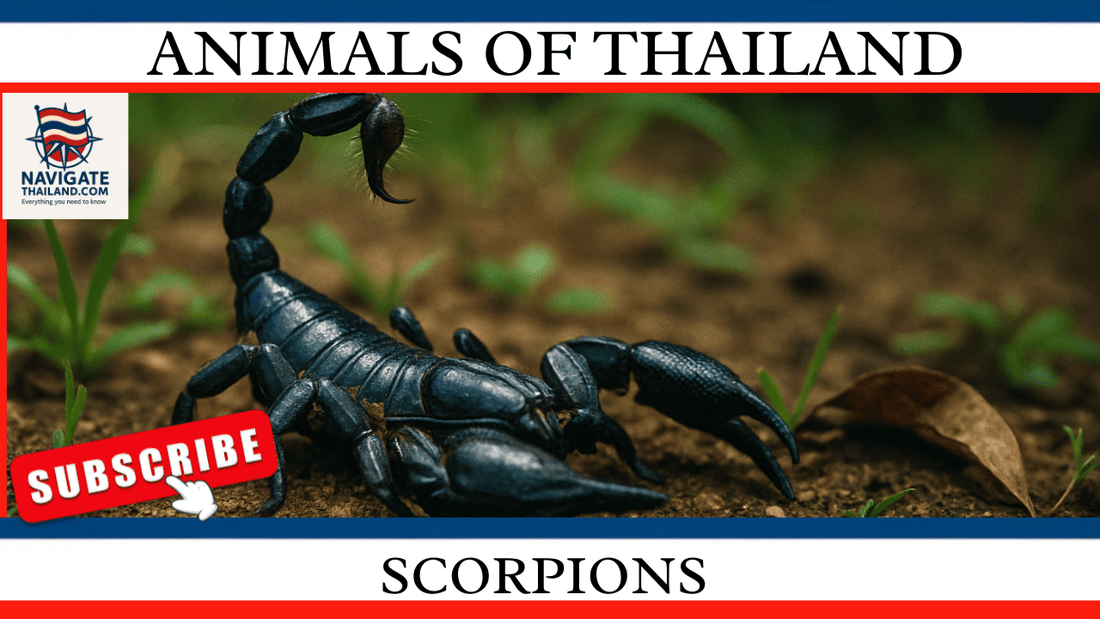
Scorpions in Thailand: Everything You Need to Know
Share
When travelling through Thailand, adventurers often encounter a vast array of wildlife, and one of the most intriguing creatures you might come across are scorpions. These ancient arachnids have roamed the Earth for hundreds of millions of years and are an essential part of Thailand’s ecosystems. From their biology to their surprising role in Thai cuisine, scorpions are much more than fearsome-looking insects—they’re fascinating creatures with a unique place in the country’s culture and environment.
In this article, we’ll explore the world of scorpions in Thailand: their habitats, species, behaviors, and even how they’ve become a street food delicacy. Whether you’re planning a trek through Thailand’s forests or just curious about the local wildlife, this guide will give you all the essential information on Thailand’s scorpions.
Scorpions: Ancient Creatures of the Night
Scorpions are arachnids, closely related to spiders, mites, and ticks. These nocturnal predators are instantly recognizable by their segmented bodies, curved tails, and large pincers. Of the 2,500 species of scorpions found worldwide, Thailand is home to several notable species, including the Asian Forest Scorpion (Heterometrus spinifer) and the Thailand Black Scorpion (Heterometrus laoticus). While their appearance can be intimidating, most scorpions in Thailand are not dangerous to humans, using their venom mainly to subdue prey.
Fun Fact: Scorpions have been around for over 400 million years, surviving multiple mass extinctions. Remarkably, they’ve changed very little since the time of the dinosaurs.
Scorpion Species in Thailand
Thailand’s varied landscapes provide habitats for a number of different scorpion species. The most commonly encountered species include:
1. Asian Forest Scorpion (Heterometrus spinifer)
One of the largest scorpions in Thailand, this species can grow up to 12 cm long. Its dark black or brown coloring and formidable pincers make it easily recognizable. The Asian Forest Scorpion thrives in humid environments such as tropical forests and is often found hiding under rocks, logs, and debris.
2. Thailand Black Scorpion (Heterometrus laoticus)
Similar in appearance to the Asian Forest Scorpion, this species is also large and dark in color. It can be found in rural areas, forests, and sometimes even in urban environments, hiding in cracks or crevices.
3. Bark Scorpions (Centruroides spp.)
Typically found in drier, more arid regions, these smaller scorpions range from yellow to brown. Their slender bodies make them distinct from their forest-dwelling counterparts. Bark scorpions are more venomous than larger species, though their stings are rarely life-threatening to humans.
4. Flat Rock Scorpions (Hadogenes spp.)
Known for their flattened bodies, these scorpions live in rock crevices. While less commonly encountered, they can be found in rocky areas throughout Thailand.
Fun Fact: Scorpions glow under ultraviolet light due to a fluorescent substance in their exoskeletons. Scientists believe this might help scorpions detect light or serve as camouflage from predators.
Scorpion Behavior and Habitat
Scorpions are primarily nocturnal, venturing out at night to hunt for prey like insects, spiders, and small vertebrates. They use their powerful pincers to capture prey, delivering a venomous sting to immobilize or kill it. Scorpions are highly adaptable, able to survive months without food, making them efficient predators in Thailand’s varied environments.
Thailand’s scorpions can be found in a range of habitats, from dense rainforests to dry, rocky areas. During the day, they hide in dark, damp places such as under rocks, logs, and leaf litter, or burrow into the ground to escape the heat. Their adaptability allows them to thrive even in urban areas.
Fun Fact: Scorpions have specialized organs called pectines on their underside, which are highly sensitive to vibrations, helping them detect prey and predators from a distance.
Are Scorpions Dangerous to Humans?
Despite their fearsome appearance, most scorpions found in Thailand are not dangerous to humans. Their venom is mild and is primarily used to subdue smaller prey. A scorpion sting may feel similar to a bee sting, causing pain, swelling, and mild discomfort at the site. However, for those allergic to venom, more severe reactions could occur, and medical attention should be sought.
The bark scorpions, which are smaller and more venomous, can pose a slightly greater risk to humans. While their sting can cause more significant pain, it is still unlikely to be life-threatening.
Fun Fact: Scorpions can regulate the amount of venom they inject during a sting, often giving a “dry sting” as a warning when threatened by larger animals or humans.
Scorpions in Thai Cuisine
One of the more surprising roles scorpions play in Thailand is their presence in street food culture. In popular tourist areas, especially in Bangkok, deep-fried scorpions are sold as snacks, typically skewered and cooked alongside other exotic insects like grasshoppers and silkworms. These scorpions are often farmed for consumption and are enjoyed by adventurous travelers curious about Thai delicacies.
While the taste of scorpions is often described as crunchy with a slightly nutty flavor, the experience of eating them is more about novelty than flavor. For the more daring traveler, trying scorpions offers a unique glimpse into Thailand’s diverse food culture.
Fun Fact: Scorpions are rich in protein and low in fat, making them a surprisingly nutritious snack. Additionally, they are a sustainable food source, requiring fewer resources to farm than traditional livestock.
Scorpion Tourism in Thailand
For those interested in observing scorpions in their natural habitats, Thailand offers plenty of opportunities. National parks and nature reserves throughout the country are home to various scorpion species. Night tours in forested areas often give visitors the chance to spot scorpions using UV lights, which make them glow in the dark.
Additionally, several educational centers in Thailand, such as the Queen Saovabha Memorial Institute in Bangkok, feature displays on scorpions, snakes, and other venomous creatures native to Thailand. These institutions offer a safe and informative way to learn about Thailand’s diverse arachnid population.
Fun Fact: In Thai culture, scorpions are sometimes seen as symbols of protection and strength. Their image is often used in tattoos and amulets, believed to bring good fortune and ward off evil.
Conservation and Protection of Scorpions
Scorpions play an essential role in Thailand’s ecosystems, helping to control insect populations while serving as prey for larger animals like birds and reptiles. However, like many species, scorpions face threats from habitat destruction, pollution, and climate change.
Thailand’s national parks and protected areas are critical for the conservation of scorpions and other wildlife. Efforts to preserve natural habitats and minimize human encroachment are vital to ensuring scorpions continue to thrive in the wild.
Conclusion
Scorpions are ancient, fascinating creatures that have survived millions of years and are now an integral part of Thailand’s diverse wildlife. Whether you spot them on a night hike, taste them as a street food delicacy, or learn about them in a museum, scorpions are bound to leave a lasting impression on your Thai adventure. Understanding their role in the environment and culture adds a deeper layer of appreciation for Thailand’s incredible biodiversity.
Have you encountered scorpions during your travels in Thailand? Share your experiences in the comments below! Don’t forget to share this blog with friends, and subscribe to our YouTube channel for more videos on Thailand’s wildlife and unique creatures.
References:
• National Geographic: “Scorpions: Ancient Predators of the Night”
• Lonely Planet: “Wildlife in Thailand: A Guide for Travellers”
• Thai Biodiversity Centre: “Arachnids of Thailand: Scorpions and Spiders”
Read more of our Thailand blog series:
Thai Food Guide:Traditional Recipes and Street Eats
Everything Travellers Need to know
Thailand travel ebooks and language guides
Thailand Travel Apparel & Souvenir Gifts
Subscribe to our YouTube channel Navigate Thailand to see our most popular Thailand travel blogs turned into videos:
Navigate Thailand YouTube channel










































































































































